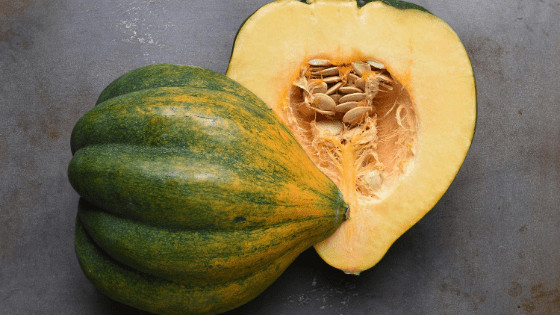Is Acorn Squash a Starchy Vegetable? Exploring the Nutritional Profile and Benefits

Introduction
As the seasons shift and autumn rolls in, various squash varieties grace our tables, bringing warmth and comfort to our meals. Among these, acorn squash stands out with its distinctive shape, rich flavor, and vibrant color. However, many people wonder: Is acorn squash a starchy vegetable? This question touches not only on the nutritional profile of this popular gourd but also on its culinary uses and health benefits. In this article, we’ll dive deep into the world of acorn squash, exploring its classification, nutritional value, cooking methods, and more, to help you understand its place in a balanced diet.
What is Acorn Squash?
Acorn squash (Cucurbita pepo) is a type of winter squash that belongs to the gourd family. Characterized by its acorn-like shape and ribbed skin, this vegetable can be found in hues ranging from green to orange. It has a sweet, nutty flavor that intensifies when roasted, making it a favorite in many autumn dishes.
Characteristics of Acorn Squash
- Shape and Size: Acorn squash is typically round and bulbous, resembling an acorn, which is how it got its name. It usually weighs between one to two pounds.
- Skin and Flesh: The skin is usually dark green or a mixture of green and orange, while the flesh inside is bright orange and is known for its slightly sweet taste.
- Seasonality: Acorn squash is harvested in late summer and early fall, making it a seasonal favorite during the autumn months.
Is Acorn Squash a Starchy Vegetable?
When discussing whether acorn squash is a starchy vegetable, it’s essential to understand the definitions of starchy versus non-starchy vegetables.
Starchy vs. Non-Starchy Vegetables
- Starchy Vegetables: These are vegetables that are high in carbohydrates and often have a higher caloric density. Common examples include potatoes, corn, peas, and winter squashes like butternut squash.
- Non-Starchy Vegetables: These vegetables are lower in carbohydrates and calories. They include leafy greens, peppers, and broccoli.
Nutritional Profile of Acorn Squash
Acorn squash falls into the category of starchy vegetables, primarily due to its carbohydrate content. However, it’s worth noting that it also provides various essential nutrients.
Macronutrients
- Carbohydrates: Acorn squash contains about 15 grams of carbohydrates per one-cup serving, which makes it starchy. This carbohydrate content includes natural sugars and dietary fiber.
- Fiber: A significant component of acorn squash is its fiber content, which helps promote digestive health and may aid in weight management.
- Protein and Fat: Acorn squash has a relatively low protein content (about 1 gram per serving) and negligible fat.
Micronutrients
- Vitamins: Acorn squash is rich in vitamins A and C, both of which are antioxidants that support immune function and skin health.
- Minerals: This squash also provides essential minerals such as potassium, which is important for heart health and maintaining proper fluid balance in the body.
- Antioxidants: The bright orange flesh of acorn squash is high in carotenoids, which are known for their antioxidant properties.
Health Benefits of Acorn Squash
Given its nutritional profile, acorn squash offers several health benefits:
- Supports Digestive Health: The high fiber content helps maintain bowel regularity and can prevent constipation.
- Promotes Heart Health: With its potassium content, acorn squash helps regulate blood pressure and supports cardiovascular health.
- Boosts Immunity: The vitamins A and C play crucial roles in supporting the immune system, helping your body ward off illnesses.
- Aids in Weight Management: As a low-calorie, nutrient-dense food, acorn squash can help you feel full while providing essential nutrients, making it a great addition to a weight-loss diet.
Cooking with Acorn Squash
Acorn squash is versatile and can be prepared in various ways, making it a fantastic addition to many dishes.
1. Roasting
Roasting is one of the most popular methods for cooking acorn squash. Simply cut the squash in half, remove the seeds, brush with olive oil, sprinkle with salt and pepper, and roast in the oven until tender. This method enhances the natural sweetness of the squash.
2. Baking
You can also bake acorn squash stuffed with a variety of fillings, such as quinoa, nuts, and dried fruits. This makes for a hearty, wholesome meal.
3. Soups and Purees
Acorn squash can be blended into soups or purees. Combine it with broth, spices, and other vegetables for a creamy, comforting dish.
4. Grilling
For a smoky flavor, you can grill slices of acorn squash. Brush with olive oil and season to taste before placing on the grill.
Pairing Acorn Squash

Acorn squash pairs well with a variety of flavors and ingredients, enhancing its versatility in the kitchen.
1. Spices
Common spices that complement acorn squash include cinnamon, nutmeg, and sage. These spices can enhance the sweetness and add depth to your dishes.
2. Proteins
You can serve acorn squash alongside proteins such as chicken, turkey, or fish. Its sweet flavor balances savory dishes perfectly.
3. Grains
Acorn squash goes well with grains like quinoa, rice, or barley, creating a satisfying and nutritious meal.
4. Nuts and Seeds
Sprinkling nuts or seeds, like walnuts or pumpkin seeds, on roasted acorn squash adds a delightful crunch and extra nutrients.
Frequently Asked Questions (FAQs)
1. Is acorn squash considered a carbohydrate?
Yes, acorn squash is considered a starchy vegetable and contains carbohydrates, primarily in the form of natural sugars and dietary fiber.
2. Can I eat acorn squash on a low-carb diet?
While acorn squash is higher in carbohydrates than non-starchy vegetables, it can still be included in moderation in a balanced low-carb diet, especially due to its fiber content.
3. How do I choose a good acorn squash?
Look for acorn squash that is firm, heavy for its size, and has a hard, unblemished skin. Avoid any squash with soft spots or visible mold.
4. How should I store acorn squash?
Store acorn squash in a cool, dry place for up to a month. Once cut, wrap it in plastic wrap and refrigerate, using it within a week.
5. Can you eat the skin of acorn squash?
While the skin of acorn squash is edible, it can be tough. Many people prefer to peel it before cooking, but if roasted or cooked well, it can be tender and delicious.
6. What is the best way to prepare acorn squash?
Roasting is one of the best methods to prepare acorn squash, as it enhances its natural sweetness. You can also stuff it, puree it, or grill it for varied flavors.
Conclusion
In summary, acorn squash is indeed a starchy vegetable, rich in carbohydrates, fiber, and essential nutrients. Its versatility in cooking and range of health benefits make it an excellent choice for any meal. Whether you’re roasting it for a cozy fall dinner, blending it into a creamy soup, or stuffing it with grains and nuts, acorn squash is a delicious and nutritious option to include in your diet. As you enjoy the flavors of the season, consider adding acorn squash to your culinary repertoire and savoring its unique taste and health benefits.




